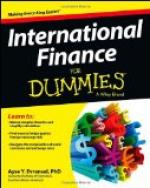Perhaps I have a weakness for financiers, but if so it is entitled to some respect, because it is based on closer knowledge of them than is owned by most of their critics. For years it was my business as a City journalist, to see them day by day; and this daily intercourse with financiers has taught me that the popular delusion that depicts them as hard, cruel, ruthless men, living on the blood and sweat of humanity, and engulfed to their eyebrows in their own sordid interests, is about as absurd a hallucination as the stage Irishman. Financiers are quite human—quiet, mild, good-natured people as a rule, many of them spending much time and trouble on good works in their leisure hours. What they want as financiers is plenty of good business and as little as possible disturbance in the orderly course of affairs. Such a cataclysm as the present war could only terrify them, especially those with interests in every country of the world. When war comes, especially such a war as this, financing in its ordinary and most profitable sense has to put up its shutters. Nobody can come to London now for loans except the British, or French, Governments, or, occasionally, one of our colonies. Any other borrower is warned off the field by a ruthless Committee whose leave has to be granted before dealings in new securities are allowed on the Stock Exchange. But when the British Government borrows, there are no profits for the rank and file of financiers. No underwriting is necessary, and the business is




